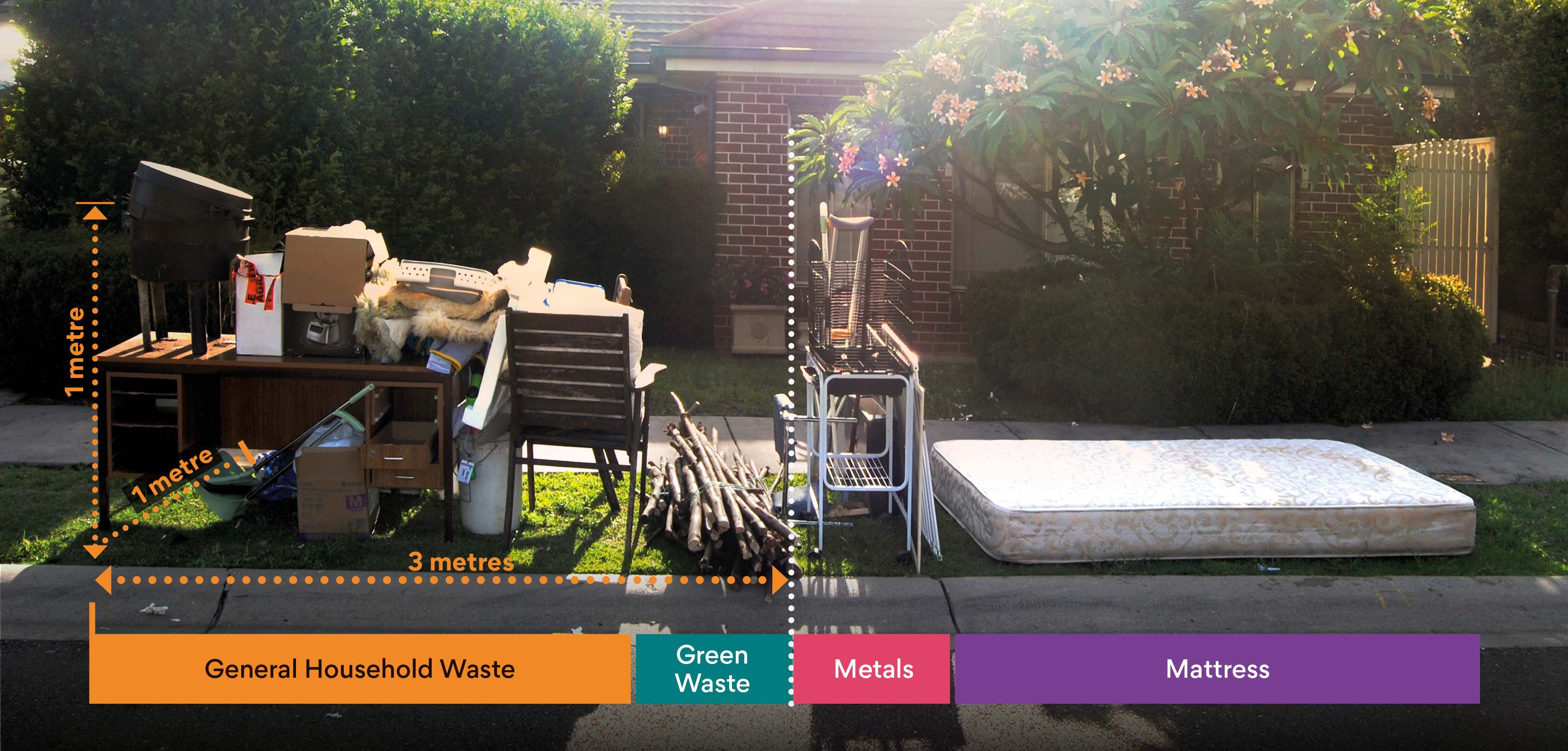How to prepare for your Council clean-up
- Planning a spring clean? We suggest you book ahead as the wait time on collections can be up to eight weeks during peak periods
- Clean-up material should be placed neatly on the kerbside to allow simple and safe access for collection staff
- Separate your collection into metals, mattresses, green waste and household items
- Household and green waste is limited to three cubic metres, excluding metals and mattresses
- Do not break up furniture
- Make sure all material can be easily handled by two people
- Place items between the gutter edge of the kerb and the edge of the footpath. Alternatively, place items between the footpath edge and the property boundary. If you live in a unit complex or villa/townhouse, please liaise with your strata or body corporate on the most suitable location
- Allow sufficient space between the clean-up material and your normal kerbside bin collection
- Do not spill material onto the roadway or obstruct pedestrian access
- Material should not be placed under trees, low power lines or other overhead obstructions
- Do not park your vehicle in front of the clean-up material
- Ensure items you don't want collected are not visible from the kerbside to avoid having them accidentally taken by collectors or stolen by opportunistic criminals
- Council reserves the right to reject any clean-up items.

Items we will collect
- Bundled garden vegetation - no longer than 1.5m, no thicker than a broomstick, must be bundled and tied
- Electrical appliances - toasters, microwaves, juicers, heaters, stereos, vacuums and hair dryers
- Fence palings and wood - no longer than 1.5 metres, no protruding nails, a maximum of 30 pieces
- Household items - furniture, lounges, lamps, sporting equipment, bicycles, toys without batteries, child car seats and car seat covers
- Mattresses or mattress ensemble - a limit of two mattresses or one ensemble (mattress plus base)
- Packaging Styrofoam - contained in a bag or box; not beans or small packaging balls
- Plastic containers and drums - must be empty
- Rugs - limit of one average-sized rug, 2m x 3m, must be rolled and taped
- White goods - fridges with doors removed, stoves, washing machines and dryers.
Items we won't collect
- Electronic waste - please dispose at our E-Waste Collection Events
- Items over 1.5m in length
- Business, industrial or commercial waste
- Items containing petrol, such as lawnmowers and whipper snippers
- Household waste - food scraps
- Medical waste, household chemicals or hazardous waste, such as paint, motor or cooking oils, car and household batteries, pesticides, fungicides, herbicides, pool chemicals, cleaning chemicals, fuels and oils, medicines, or any liquids. Please dispose of these items at our Household Chemical CleanOut Events
- Electrical items containing batteries, such as toys, games., stick vacuum cleaners, e-bikes, e-scooters, etc.
- Air conditioning units and solar panels
- Sheet glass - such as shower screens, mirrors, windows, glass panes and glass tabletops
- Gas bottles
- Fire extinguishers
- Heavy loads of wood or metals
- Building or demolition materials, such as bricks, rubble, tiles, soil, renovation materials and asbestos
- Carpet
- Bean bags filled with bean bag beans
- Thorny branches or bushes, such as palm fronds, roses, bamboo, tree stumps and roots
- Pipes, timbers or roller doors over 1.5m in length
- Drums or oil heater tanks
- Car parts or tyres
- Railway sleepers
- Sand-filled pool filters
- Cast iron baths
- Tree stumps or roots
- Fibreglass products, such as baths, canoes, surfboards and roofing
- Treated pine or timbers.
What happens if my clean-up material is put out earlier than the night before?
Early presentation of clean-up material:
- leads to illegal dumping, which means Council has to pay more in disposal costs
- attracts illegal dumping of hazardous materials, such as chemicals, that could be dangerous to the general public and cannot be collected by Council
- results in longer periods where rubbish and waste material fill our streets
- places constraints on our clean-up collection operations.
Where early presentation of clean-up material has been identified:
- the resident or booking agent will be contacted by Council to advise they are responsible for the removal of the waste presented early, including any additional material that may have been dumped
- The resident will have 48 hours to comply with this request
- our rangers will inspect the site to ensure the material has been removed within the specified time
- should the resident or booking agent fail or refuse to remove the material, penalties may be issued
- the original booking will still count as one of the collections allocated for that financial year and the early presentation will be noted against that property.